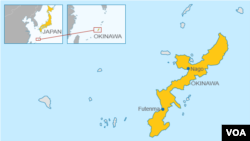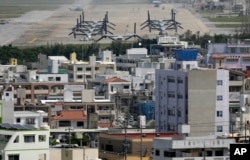In a continuing legal battle, Okinawa officials sued Japan's central government Friday in an attempt to stop the relocation of a U.S. air base from a heavily populated area to a less-developed area of the tiny island.
The legal battle is the latest chapter in a long-running dispute between the central government and Okinawa regarding the relocation of U.S. Marine Corps Air Station Futenma.
In October, Okinawa Gov. Takeshi Onaga canceled approval for reclamation work needed to relocate the base.
2014 campaign
The reclamation approval had been given by his predecessor, Hirokazu Nakaima, whom Onaga ousted in 2014 elections. Onaga had campaigned on a pledge to block the relocation of the U.S. base.
To counter, Japan's Ministry of Land, Infrastructure, Transport and Tourism suspended Onaga's cancellation order. In November, the central government sued to seek control of the project from Onaga.
In the lawsuit filed Friday, the Okinawa government filed a lawsuit, saying the land ministry illegally suspended Onaga's cancellation of approval for reclamation work.
"We will do whatever it takes to stop the new Henoko base," Onaga told a news conference in the prefectural capital of Naha. "Okinawa's argument is legitimate, and I believe that it will be certainly understood."
20-year plan
Japan and the United States have been trying for nearly 20 years to relocate the Futenma Air Station from a residential area of Okinawa to the less developed area of Henoko Bay.
Many residents, however, want the base moved off the island completely, citing frustrations with the heavy U.S. military presence on the island, which is about 2,000 square kilometers (463 square miles) in size. Residents living near Futenma have long complained about noise from the air base, pollution and crime, including several high-profile rape cases.
About 50,000 U.S. troops are stationed in Japan, more than half of them on Okinawa. U.S. troops are positioned there to rapidly respond to regional threats, provide disaster assistance, and defend the interests of the United States and Japan.
Okinawa makes up less than 1 percent of Japan's total land area, but is home to about 74 percent of U.S. military bases in the country.
Burden
Onaga has argued previously that it is unfair for Okinawa residents to shoulder all of the burden of hosting the U.S. bases. He said he hoped the legal battle would help raise awareness of the problem.
"Democracy and local self-determination in Japan are in severe condition," Onaga said. "We want the rest of the world to know how the Japan-U.S. security treaty is affecting us."
Past crimes by U.S. military members on Okinawa have sparked mass demonstrations and calls for a reduction in the number of troops stationed there.
Some material for this report came from AP.













